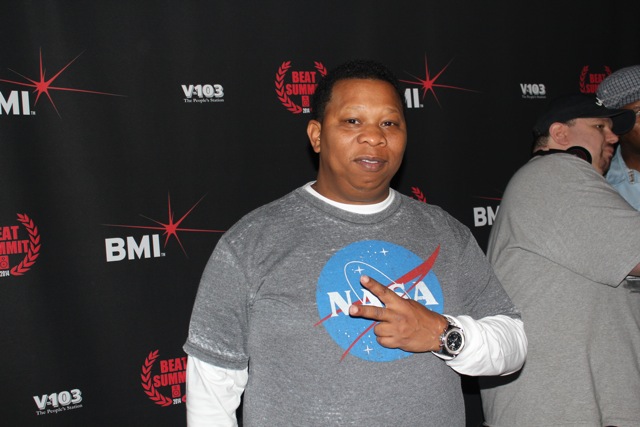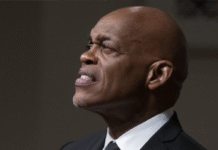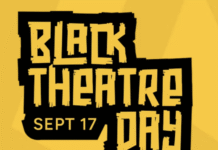
(Photo Credit: DJ Blak Magic)
In the late 1990s when mainstream hip hop culture was becoming more commercially viable and making a coastal migration below the Mason-Dixon Line, Mannie Fresh established himself as a Southern hip hop force to be reckoned with. The New Orleans native from 7th Ward was Cash Money Records’ resident producer and instrumental in turning local talent Juvenile, B.G. and Grammy winner Lil Wayne into million-selling acts.
As the beat drops, Fresh utters his stage surname mimicking scratching on a turntable. He takes the Big Easy’s danceable bounce music and tops it off with hypnotic polyrhythmic drum cadences, a hint of bass, choppy keyboard riffs, a few ad-libs and catchy hooks. The son of a DJ, Fresh, an extroverted turntablist born Byron Thomas, prefers to use vintage Moog synthesizers, SP1200 drum machines and live musicians to craft his sound.
Fresh describes New Orleans’ delectable music scene with just one word. “It’s gumbo,” he says with a New Orleans drawl. “It’s a whole bunch of ingredients. Some of it comes from jazz. Some of it is rhythm. Some of it is hip hop. Put it all together, and you get New Orleans.” During Fresh’s stint under Cash Money, label heads and brothers Ronald “Slim” and Bryan “Baby aka Birdman” Williams inked a pioneering deal with its parent company, Universal Records. The terms of the agreement allowed Cash Money to retain 85% of all royalties, complete ownership of master recordings and 50% of publishing, which was unheard of for boutique hip hop imprints. The prolific Fresh, formerly one-half of the label’s Grammy-nominated duo, Big Tymers, had the Midas touch churning out memorable singles like “Ha,” “Back That A– Up,” “Bling Bling,” “Still Fly,” “Get Your Roll On,” “Number One Stunna,” “The Block is Hot” and “Go DJ.”
When Fresh left Cash Money in 2005, the spirited beatmaker kept the momentum going. He created his own imprint, Chubby Boy Productions. The sought after producer also laid down tracks for T.I., The Notorious B.I.G., Toni Braxton, Kanye West, Bun B., Trina, Gucci Mane, Noreaga, Chamillionaire, Young Jeezy, Rick Ross, T-Pain, 2 Chainz and Yasiin Bey (Mos Def). Even though the bulk of Fresh’s production work is with hip hop artists, he says having good business ethics are essential regardless of the artists or genre. “Don’t practice homeboy business. It’s the first thing that’s gonna get you in trouble,” he says.
Fresh adds, “Music is a little part of it. What comes after is the big part. That’s most of the battle. Your professionalism and mannerism have to be intact,” he says. He recently curated BMI’s Beat Summit in Atlanta along with fellow beatminers DJ Toomp and KLC. Positioned stage left at Terminal West behind mixers and turntables, Fresh was flanked by a massive crowd of onlookers and smoke clouds. If he wasn’t joking around with his “competing” producers, Fresh was steadily cranking out some of his bangers before the euphoric packed house. T.I., who collaborated with all three producers, performed his Fresh-produced singles, “Top Back” and “Big Things Poppin’ (Do It).”
These days, Fresh has gone back to his roots of being a DJ. He notices that his audiences are primarily composed of young white kids that love hip hop. During Beat Summit’s pre-show meet-and-greet, Fresh expresses how proud he is to have longevity as hip hop’s audiences and climate constantly change. “Just to see this generation embrace Mannie Fresh and some of them wasn’t even born tells me I’m something special,” says Fresh. “They embrace the music. They know all the lyrics to the songs I’m playing. They know my bio and my background. They paying attention and shining on me.”
Fresh goes on to say that transitioning between the recording console and the turntables is the best method for him to stay connected to his consumers. Spinning records fuels Fresh’s creativity. “I had to get in people’s face again to make them remember,” says Fresh. “It’s where I started from. It gives me a chance to interact with what’s going on in the club and what people like. Then, I can hit the studio again.”
Fresh remains easy going and passionate about using music to make people dance, nod their heads and smile. Onstage, he makes it a priority to rework the bulk of his Cash Money productions so the crowd can recite the lyrics even when the music fades out.
Right before Fresh hits the stage and rocks the house, he says he wants his production and spinning records at parties and clubs to do one thing. “I just want my music to heal the world. That’s where I’m at,” says Fresh.
This post was written by Christopher A. Daniel, pop cultural critic and music editor for The Burton Wire. He is also a contributing writer for Urban Lux Magazine and Blues & Soul Magazine. Follow Christopher @Journalistorian on Twitter.
Like The Burton Wire on Facebook. Follow us on Twitter @TheBurtonWire.









Great info. Lucky me I recently found your site by accident (stumbleupon).
I’ve bookmarked it for later!
[…] “Luke” Campbell is heavily featured in the documentary, but UGK, the Geto Boyz and Mannie Fresh are absent. Perhaps in wanting to drive home the point that Atlanta rap music is as significant as […]
[…] growth. Luther "Luke" Campbell is heavily featured in the documentary, but UGK, the Geto Boyz and Mannie Fresh are absent. Perhaps in wanting to drive home the point that Atlanta rap music is as significant as […]
Comments are closed.